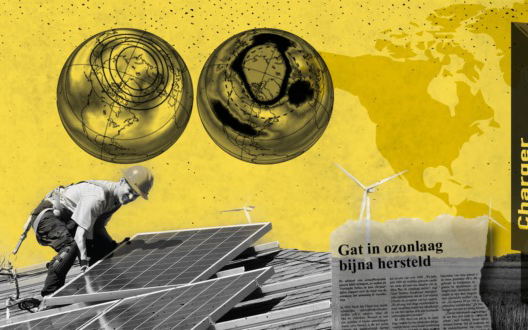Is the world malleable after all?
13-01-2023
Opinion
Jacob Hoekman, RD

Photo Corné van der Horst
Opinion
One of the most significant social schisms of today, and possibly of the years to come, is the climate. Now, you could easily fill a whole series of episodes of this column on that because the topic is, after all, broad. But it is always good to make big problems small by focusing on one sub-theme. For instance, that of left-wing climate freaks and their malleability thinking. Because are these lunatics really as crazy as they are thought to be?
To ask the question is to answer it. The word climate freak was coined a few years ago to silence people concerned about climate change, just like it happened earlier with orthodox Christians or Muslims, who could suddenly be brushed off with the word religious freak.
Us vs them
Journalist Jakob Hoekman researches history to find answers to difficult questions related to the news.
Their critics argue that climate freaks are people who think we need to change our entire lives to counter supposed global warming. Climate freaks, they say, are typical left-wing figures who are drenched in malleability thinking. As if we as humanity could bend such significant developments as climate to our will.
Policies
Yet, to some extent, that is precisely what happened with the ozone hole and acid rain. Acid rain has largely disappeared. Not because the problem did not exist but because policies were implemented to deal with it. For instance, one of the culprits, sulphur oxide emissions, was reduced by more than 80 per cent: an astonishing result.
The hole in the ozone layer shows the impact of policy measures even more evidently. This week, a panel of experts from the United Nations concluded that we are on the right track. The ozone layer, which protects us from harmful radiation from the sun, is clearly recovering.
According to the UN, there is no question why: the harmful chemicals in aerosols, refrigerators and other appliances used everywhere until the 1990s have been successfully phased out. Up to 99 per cent of those chlorofluorocarbons (CFCs) are no longer used today, and that policy has results.
Behold the rightness of the climate freaks with their malleability thinking. Environmental and climate problems appear to be, at least to some extent, effectively controllable.
Difference
The successes on ozone and acid rain are, of course, naturally used as arguments for climate action. "Ozone action sets a precedent for climate action," World Meteorological Organisation secretary-general Petteri Taalas said this week. Fighting climate change successfully is apparently possible.
But the way how to do it makes a lot of difference. The problems of ozone and acid rain were solved similarly: through effective government intervention. The solution, in other words, lies in politics that restrict or ban the emission of certain gases.
That is different from what is often put forward as a solution to the global climate problem, for example, by progressive researcher Adrienne Buller in her recent book "The Value of a Whale". She seeks refuge in collective behavioural change. People should consume less, travel less, and do less of everything. The message to be put out is: "You already have too much of everything, and you are only going to get less. Moreover, you should be content with that."
In fact, people who propagate these kinds of solutions don't just want policy changes but a fundamental change in human nature. Now that is malleable thinking.
Marxism
Inspiring in this respect is the recent book "Climate Change as Class War" by Matthew T. Huber. He is a professor of Geography and the Environment and, like Buller, seeks solutions on the left side of the political spectrum in terms reminiscent of Marxism and anti-capitalism.
But unlike Buller, Huber is more realistic. People are not going to impose all sorts of restrictions on themselves voluntarily, he analyses. And industry, based on the capitalist revenue model of more is better, will definitely not do that. So rules have to be set. Strict rules that cannot be tampered with, just like the rules that banned CFCs in spray cans.
Yet those rules are not the most important. Policies alone are not going to save the climate. According to Huber, we should see the climate crisis as an opportunity to make the world a bit more liveable for everyone and certainly also for the victims of capitalism.
He is convinced that tackling the climate crisis does not have to be costly. Take a cancelled rural bus service. He argues that investing in such bus lines is good for people and the environment. The same goes for promoting solar energy or subsidising home insulation. And, of course, electric car driving. These are all measures that, if appropriately implemented, help combat climate change and can even make money for individuals. Once the "working class" gets excited about it, Huber argues, there is no escaping from it.
Green Deal
Such ideas are not new and are already being rolled out in the Western world to some extent, often under the banner of the Green Deal. For example, the Green New Deal is an umbrella term for projects aiming to lead the United States to a more sustainable world while distributing wealth equitably. The same applies to the European Green Deal, agreed upon in the European Union in 2020.
Although Huber squeezes those kinds of goals into a Marxist jacket, they are so apolitical to interpret that even a rightist cabinet, such as in the Netherlands, could do something with them. After all, even there, it has now dawned on them that the climate freaks of a few years ago might have had a point after all.
Related Articles






